22 Aug 2013 | Digital Freedom, Index Reports, News and features, Politics and Society, Religion and Culture, United States
[vc_row][vc_column][vc_row_inner equal_height=”yes” css=”.vc_custom_1493909012654{background-image: url(https://www.indexoncensorship.org/wp-content/uploads/2017/05/USMedia_ReportCover_1460x490-revised.jpg?id=90089) !important;background-position: center !important;background-repeat: no-repeat !important;background-size: cover !important;}” el_class=”text_white”][vc_column_inner width=”1/2″][/vc_column_inner][vc_column_inner width=”1/2″][vc_custom_heading text=”It’s not just Trump” link=”url:https%3A%2F%2Fwww.indexoncensorship.org%2Fnot-just-trump-us-media-freedom-fraying-edges%2F|||”][vc_column_text]
Read our May 2017 review of threats to press freedom in the United States.[/vc_column_text][/vc_column_inner][/vc_row_inner][vc_empty_space height=”20px”][vc_column_text]
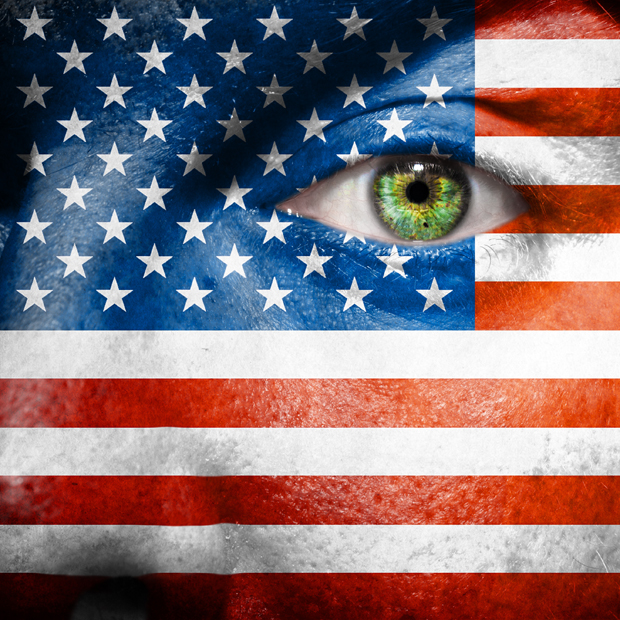
(Photo illustration: Shutterstock)
Freedom of expression is generally protected in the US, but political, legal, economic and cultural factors continue to constrain this fundamental right. The First Amendment of the US Constitution prohibits laws that abridge free speech, academic freedoms and the right to assemble are generally protected, and violence against journalists is rare.
National security is used excessively to justify free speech and privacy restrictions.
Revelations over the National Security Agency’s “Prism” programme, which it is claimed gives the US government powers of mass surveillance over web communications, have caused huge concern over the authorities’ attitudes to free speech and privacy.
Government transparency and accountability are also key concerns. The 1966 Freedom of Information Act and various state laws are meant to shine light on classified government documents, but many agencies do not comply with these laws or do so significantly later than mandated and with heavily redacted information. The aggressive prosecution and sentencing of WikiLeaks source Bradley Manning and the pursuit of Edward Snowden highlights the Obama administration’s attitude to whistleblowers.
Beyond security and secrecy, some of the greatest challenges to freedom of expression are linked to rapid shifts in technology and online behaviour so that is for digital section. Money is also key. The Citizens United v. Federal Election Commission Supreme Court case in 2010 extended first amendment rights to corporations and unions, threatening the free speech rights of individuals by diminishing the power of their voices to compete with billion-dollar industries. Although US libel laws generally protect the public interest — public figures must prove actual malice rather than mere negligence to win a suit — “Strategic lawsuits against public participation” (SLAPPs) sometimes silence criticism, as libel actions in the US remain expensive.
Despite these concerns, the state of free expression in the US is generally healthy.
Media Freedom
The US enjoys a free and diverse press, although aggressive political partisanship, the consolidation of media ownership and other financial troubles have threatened this freedom as traditional institutions struggle to stay afloat and adapt to an increasingly digital media landscape. Local and national newsrooms have shrunk, and reporters are overstretched , diminishing the quality of American journalism.
Laws against obscenity, indecency and profanity set out and enforced by the Federal Communications Commission (FCC) restrict what content can appear on free-to-air broadcasting.
Most states have shield laws that protect journalists from revealing their sources, and the Obama administration is proposing a federal shield law, But the government’s prosecution of whistleblowers has raised real concern. The accessing of Associated Press reporters’ phone records in pursuit of leaks has also been a source of alarm.
The Obama administration has been criticised for its aggressive pursuit of whistleblowers and journalists and demands for source information in cases of government secrecy. While the president did sign a Whistleblower Protection Enhancement Act into law in late 2012, the behaviour of the authorities when confronted with leaks has been heavy handed.
Meanwhile, physical attacks by police against journalists and bloggers covering the Occupy movements hurt the US’ ranking in several press freedom indices in 2012.
Digital Freedom
About 75 percent of the population is online, but affordable high-speed broadband remains elusive. Copyright legislation and surveillance currently represent some of the greatest threats to digital freedom of expression.
The latest Google Transparency report shows that the US requests more user data than any other country and issues the second most court orders for content removal behind Brazil. The 1998 Digital Millennium Copyright Act (DMCA) criminalises the circumvention of copyright controls online without regard for how users intend to use the tools. The Stop Online Piracy Act (SOPA) and PROTECT IP Act (PIPA) were shelved in 2012 following highly publicised website blackout campaigns by internet activists and web companies, but intellectual property rights remain a concern with secret negotiations around the Trans-Pacific Partnership trade agreement on-going. Efforts are also underway to reform the 1986 Electronic Communications and Privacy Act (ECPA), which allows the government to access private emails older than 180 days without warrant.
PATRIOT Act provisions and the fact that US telecommunications companies comply with millions of government requests for user data have given Americans cause to self censor their electronic communications. The Cyber Intelligence Sharing and Protection Act (CISPA)[1], which passed through the House of Representatives twice but stalled in the Senate, would have compounded the threat of self censorship by granting companies greater immunity to share private user data with secretive government agencies. In June, it was revealed that the government has been secretly collecting the call records of Verizon customers under the PATRIOT Act and that the National Security Agency can access the servers of Google, Facebook, Apple, Yahoo, Microsoft and others to monitor users’ video calls, search histories, live chats, and emails. Concern is also growing over how domestic drones used for surveillance will affect individuals’ privacy] and how American web companies are in a sense privatising censorship through terms of service that restrict freedom of expression.
Artistic Freedom
The First Amendment protects artistic freedom in the US, but fear of offence still motivates censorship and self-censorship. Nudity, pornography, obscenity and religious sensitivity are among the most common reasons visual art is censored from public space in the US. Censorship typically occurs at the gallery level where art is removed in response to controversy rather than through legal mandate. Donor funding can also dictate the type and content of art displayed. A US university removed a controversial climate change sculpture without warning in May 2012 when it upset a major donor from the energy industry. High sensitivity to political correctness and concerns about marketability sometimes lead artists to self-censor what they produce, and donor funding often dictates the type and content of art that is displayed. A growing trend of online crowdsourced funding for the arts is helping to overcome this barrier for specific projects.
Controversial books are still removed from or kept out of local public libraries across the country — in March 2013, for example, the Chicago public schools authority demanded the graphic novel Persepolis be removed from its classrooms — and music is regularly stripped of violent references and profanity at stores and on radio due to private decisions or Federal Communications Commission mandates.
Increasingly strict copyright laws keep much art out of the public domain despite relatively liberal fair use provisions. Due to copyright extensions, which now extend to 70 years after the creator’s death, many creative works originally due to enter the public domain this year will not do so until 2052.
This article was originally published on 22 Aug, 2013 at indexoncensorship.org[/vc_column_text][/vc_column][/vc_row][vc_row][vc_column][vc_custom_heading text=”Join the Index mailing list and get an exclusive gift” font_container=”tag:p|font_size:28|text_align:left” use_theme_fonts=”yes”][vc_separator color=”black”][/vc_column][/vc_row][vc_row][vc_column width=”1/2″][vc_column_text]
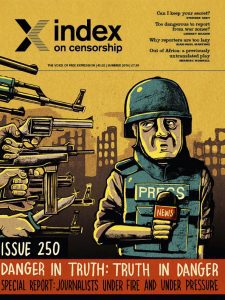
Index on Censorship’s summer magazine 2016
We’ll send you our weekly emails and periodic updates on our events. We won’t share your personal information with anyone outside Index.
You’ll also get access to an exclusive collection of articles from our landmark 250th issue of Index on Censorship magazine exploring journalists under fire and under pressure. Your downloadable PDF will include reports from Lindsey Hilsum, Laura Silvia Battaglia and Hazza Al-Adnan.[/vc_column_text][/vc_column][vc_column width=”1/2″][gravityform id=”20″ title=”false” description=”false” ajax=”false”][/vc_column][/vc_row][vc_row][vc_column][vc_separator color=”black”][/vc_column][/vc_row][vc_row][vc_column][vc_basic_grid post_type=”post” max_items=”12″ style=”load-more” items_per_page=”4″ element_width=”6″ grid_id=”vc_gid:1493908631860-3269808c-fbd5-9″ taxonomies=”579″][/vc_column][/vc_row]
20 Aug 2013 | Digital Freedom, Index Reports, News and features, Politics and Society, Religion and Culture, Russia
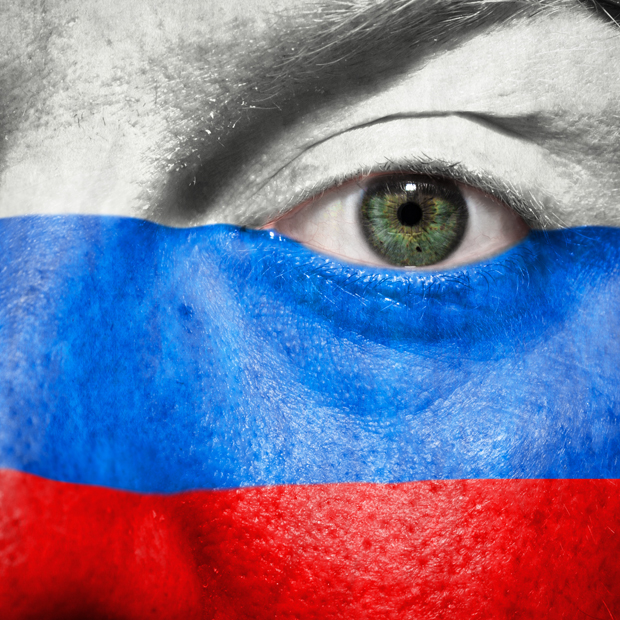
(Photo illustration: Shutterstock)
The situation for freedom of expression, freedom of assembly and association in Russia has deteriorated since the re-election of Vladimir Putin in March 2012. The main issues of concern are repression against Russian NGOs, strict anti-blasphemy laws, increasing limits on digital freedom, the banning of “homosexual propaganda” and the re-criminalisation of libel.
Amendments to the law on Non-Governmental Organisations, adopted in July 2012, forced all NGOs that receive funds from abroad to register as “foreign agents” (a highly charged phrase, synonymous with “spy”) if they are involved in “political activities”, the latter term being very broadly defined. During March 2013, dozens of NGOs in Russia were inspected to determine whether their activities comply with current legislation. This potentially endangers the activities of NGOs in Russia including those working on freedom of expression and human rights groups.
Freedom of religious expression has been compromised through anti-extremism legislation that allows selective implementation of its ambiguous definitions. An anti-blasphemy law that provides for prison terms or fines for offending religious feeling was passed by Russia’s parliament in April 2013.
The attitude of the authorities to whistle-blowers has been highlighted through the authorities’ posthumously trial of lawyer Sergei Magnitsky. Magnitsky investigated cases of corruption among high-ranking Russian officials; he died in prison in 2009 in pre-trial detention and no one has ever been charged with his death.
Freedom of expression in the LGBT community has been restricted after the State Duma adopted a law prohibiting the promotion of homosexuality. Similar laws were previously introduced at the regional level in 11 administrative entities of the Russian Federation, including the second largest city St. Petersburg.
Media Freedom
Russia continues to be one of the most dangerous countries in the world for journalists. According to the Committee to Protect Journalists, 54 reporters have been killed in Russia since 1992, with 16 cases still unsolved. Impunity remains a significant problem for journalists: on-going threats of violence are rarely investigated properly by the authorities. The killers of Natalia Estemirova, Abdulmalik Akhmedilov, Khadzhimurad Kamalov and other prominent investigative reporters have never been prosecuted; nor have the organisers of Anna Politkovskaya’s murder.
In July 2012, criminal libel was reintroduced by the State Duma into the criminal code after being decriminalized in November 2011. Defamation laws are used to silence the press. Dmitry Muratov, the editor-in-chief of Novaya Gazeta, says courts are used as a censorship instrument in Russia. His newspaper lost three libel appeals in just one week in November 2011, all issued by the Department of Presidential Affairs after they published investigative journalism into federal budget spending.
Other legislative challenges to media freedom in Russia include a law on high treason that endangers Russian journalists who work for the international media, as it prohibits providing information to foreign countries, and a law that forbids the media from using obscene words. Another draft law will classify media outlets that receive more than 50 per cent of their revenues from abroad as “foreign agents”.
The genuine diversity of media ownership in Russia is questionable. Opinion polls by the Levada Centre show that 69 per cent of Russian citizens consider the three state-owned TV channels to be the primary source of their information. Most of the other national media outlets are either co-owned by the state, or belong to oligarchs who have relationships with the Kremlin. Several top managers and editors recently were fired or resigned from their positions in Kommersant and Gazeta.ru in protest against their owners’ intrusion into editorial policies. Several independent online publications critical of the authorities were closed down by their owners.
The lack of independent political and investigative reporting is not likely to be rectified by the launch of a new channel “Public Television of Russia”, scheduled for May 2013. While the new channel has been described as a public service broadcaster “equally independent from the state and advertising”, it will in fact rely on government funding. Furthermore, its CEO is appointed directly by the President of Russia, casting further doubts over its editorial independence.
Digital Freedom
As internet use grows in Russia, the authorities have introduced new restrictive laws that challenge free expression online and allow filtering and blocking of content. Federal Law No. 139-FZ, adopted in July 2012 created a blacklist of sites with “harmful” information under a pretext of child protection. The law suggested broad and ambiguous definitions that allow extrajudicial censorship of online content. Roskomnadzor, a dedicated state agency, compiles a black list of web-pages that contain child pornography, “extremist materials” and information on suicide or drug use. ISPs are obliged by the law to block all the blacklisted web-pages.
Extensive online censorship is accompanied by surveillance of Russians’ online activities. SORM, a nation-wide surveillance system, operated with Deep Packet Inspection (DPI) technology, allows the state security force not only to control, but even to intrude into the internet traffic of any internet user in Russia without any special permit or court decision.
There was a series of cyber-attacks on the websites of independent Russian media outlets, such as Kommersant, Ekho Moskvy, Bolshoi Gorod, Dozhd’ TV and Slon.ru, during the street protests in May 2012. No one has been prosecuted for these attacks.
Artistic Freedom
As the authorities of the country try to increase its electoral support among more conservative layers of society, they rely more on support of the Russian Orthodox Church. Increasingly close political relationships between the state and the church account for much of the persecution of artists and censorship of arts on grounds of “protecting of traditional values”. One of the recent draft laws, adopted by the parliament in the first reading, provides for five years in prison for “insulting believers’ feelings”. Reports talk about increasing self-censorship among artists; several cases of prosecution were noted as well.
In August 2012 Nadezhda Tolokonnikova, Maria Alekhina, and Ekaterina Samutsevich, members of punk group Pussy Riot, were each sentenced to two years imprisonment for organising a “punk prayer” in the Cathedral of Christ the Saviour in Moscow. Despite the group claiming their performance was an artistic act of political protest against President Putin’s regime, they were found guilty of “hooliganism motivated by religious hatred.” In October 2012, Samutsevich was released on probation, but sentences against the other two members of the band were upheld.
Anti-extremist laws and articles of the Criminal Code relating to incitement to religious hatred have long been used for censorship of art in Russia. In July 2010 art curators Andrei Erofeev and Yuri Samodurov were fined for organising the Forbidden Art 2006 exhibition in Moscow, after several of the works were claimed by prosecutors to “incite hatred” and “denigrate human dignity.” In December 2012, prosecutors in St Petersburg launched an investigation into an exhibition by British artists Jake and Dinos Chapman after visitors complained it was “blasphemous” and “extremist” for featuring images of a crucified Ronald McDonald and Nazi symbolism.
This article was originally published on 20 Aug, 2013 at indexoncensorship.org. Index on Censorship: The voice of free expression
19 Aug 2013 | Digital Freedom, France, News and features, Politics and Society, Religion and Culture
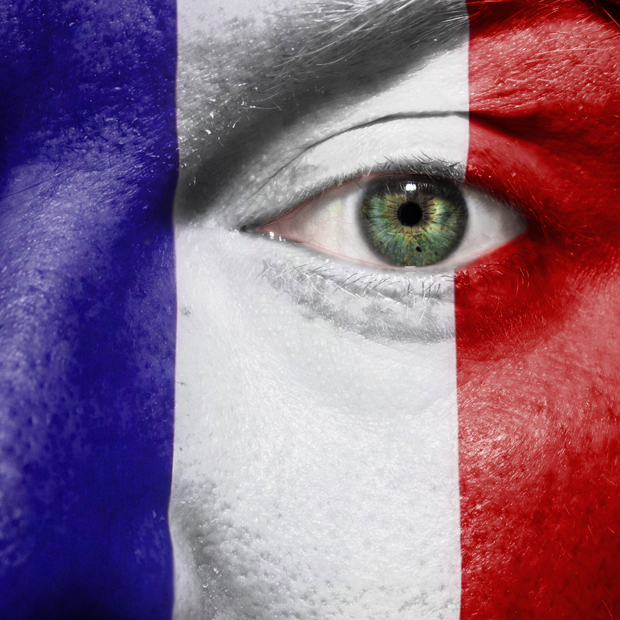
(Photo illustration: Shutterstock)
Freedom of expression is generally protected in France, although is limited by strict defamation and privacy laws. Several laws have passed since 1972 that have further restricted this fundamental right.
In addition to strict privacy laws, France’s libel laws make it easy to sue for defamation. Losing a libel case against a public official carries a higher fine (€45,000) than libel against a private individual (€12,000), which chills public interest criticism of politicians and government officials.
France has some of the toughest hate speech laws in the EU. The number of legal actions for hate speech have multiplied after the 1881 Law on Press Freedom was amended to introduce the offence of inciting racial hatred, discrimination, violence, or contesting the existence of crimes against humanity, which has been very broadly interpreted as the right not to be offended or criticised. Some civil society groups have even managed to force the cancellation of public debates in order to prevent potentially libellous or racist remarks[1].
Since 2004, wearing signs or clothing that overtly manifest a religious affiliation is prohibited in schools[2]. In 2011, France implemented a ban on the niqab or face veil in public places. In September 2011, Paris passed a ban on Muslim street prayers, restricting the right to religious expression.
Media Freedom
France’s media is generally regarded as free and represents a wide range of political opinion. Still, it faces economic, social and political challenges in particular from the security services and from the country’s stringent privacy laws.
Since 2009, France’s president has appointed the executives in charge of its public broadcasting outlets. This controversial measure was heavily criticised since, as it was seen as politicising public broadcasting and put into question its executives’ independence President Francois Hollande has promised to relinquish this privilege. He has also promised to review policies related to public broadcasting funding and management.
Another challenge for media freedom in France has been state intervention to prevent the exposure of corruption. According to the Committee to Protect Journalists, former President Nicolas Sarkozy used the security services to identify the sources of leaks around the 2010 Liliane Bettencourt affair. In addition to accessing the phone records of a Le Monde journalist, journalists from major newspapers were also investigated. Not only did the chief of intelligence violate the confidentiality of journalistic sources, but he questioned the journalist’s right to investigate public corruption.
France’s privacy law is often described as the toughest in the world. This is because the publication of private details of someone’s life without their consent is a punishable offence, with limited public interest defences available. Privacy is safeguarded not only by civil law provisions but also by the existence of specific criminal offences which indirectly promote the withholding of information and self-censorship and limit the exposure of political corruption.
Digital Freedom
About 79.6% of the French population is online. Yet, digital freedom is curtailed by anti-terror laws, increased online surveillance and libel laws.
Online surveillance has been extended as a result of a 2011 anti-terror law[3] and Hadopi 2 (the law “promoting the distribution and protection of creative works on the Internet”) which is supposed to reduce illegal file downloading. Hadopi 2 makes it possible for content creators to pay private-sector companies to conduct online surveillance and filtering, creating a precedent for the privatisation of censorship. Another 2011 law requires internet service providers to hand over passwords to authorities if requested. Concerns have been raised over new legislation enabling the authorities to impose filters on the web without a court order and on the impact of new anti-terror laws that allows for the blocking of websites.
The French Press Freedom Law of 1881 – which guarantees freedom of expression for the press – has been amended so that it applies to online publication. It aims to extend the protections for press freedom online but also allows people to take legal action for libellous or hate speech online, including on blogs posts, tweets and Facebook comments. In October 2012, a French court ruled that Twitter should provide the identities of users who tweeted jokes deemed to be offensive to Muslims and Jews. This was after the Union of French Jewish Students threatened to bring the social media giant to court. During the course of the case, French Minister of Justice Christiane Taubira said that it is a punishable offence to make racist or anti-Semitic comments online. There is pressure to reframe the 1881 Law on Press Freedom, which many consider “no longer adapted to new technologies”.
Artistic Freedom
France has a vibrant art scene but one restricted in various ways by hate speech laws and by interference from public authorities.
Racial hatred and other discriminatory and violent language in artistic work with a potentially large audience is criminalised as a “public expression offence”. Many artists have been brought to Court for this offence which lies mainly in Article 24 of the 1881 Law on Press Freedom.[4] This offence is particularly serious since it is punishable by five years’ imprisonment and a €45,000 fine. Government officials, civil society groups, and individuals have repeatedly sued artists for defamation and incitement to violence.
The Code of Intellectual Property protects artistic works whatever their content and merit, and protects their authors. However, artistic freedom of expression can be restricted by various authorities – Ministry of Culture, Superior Council of Audio-visual (Conseil supérieur de l’audiovisuel, CSA) – whose decisions may limit not only the dissemination of works, but also their production (TV, films).The CSA for example, whose members are political appointments, is regularly exposed to pressure from the public, elected officials, or political authorities to censor artistic works.
[1] Loi n° 2004-228 du 15 mars 2004 encadrant, en application du principe de laïcité, le port de signes ou de tenues manifestant une appartenance religieuse dans les écoles, collèges et lycées publics [Law of 15 March 2004, forbidding signs and clothing showing religious affiliation such as headscarves, Jewish skullcaps and oversized Christian crosses in public primary, secondary and higher education]
[2] Loi n° 2011-267 du 14 mars 2011 d’orientation et de programmation pour la performance de la sécurité intérieure [Law of 14 March 2011 on guidance and planning for the performance of domestic security]
[3] Décret n° 2011-219 du 25 février 2011 relatif à la conservation et à la communication des données permettant d’identifier toute personne ayant contribué à la création d’un contenu en ligne [Decree of 25 February 2011 on the conservation and communication of data to identify any person who contributed to the creation of online content]
[4] Loi du 29 juillet 1881 sur la liberté de la presse, Version consolidée au 23 décembre 2012 [Law of 29 July 1881 on Press Freedom]
This article was originally published on 19 Aug, 2013 at indexoncensorship.org. Index on Censorship: The voice of free expression
15 Aug 2013 | Digital Freedom, Index Reports, Italy, News and features, Politics and Society, Religion and Culture
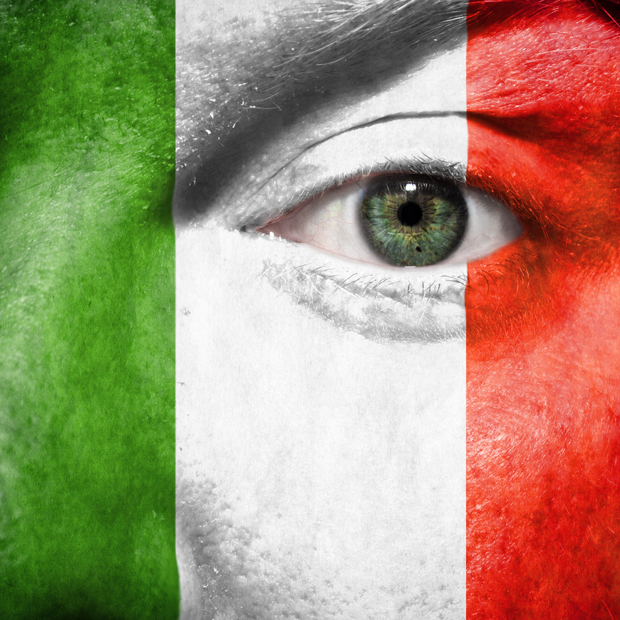
(Photo illustration: Shutterstock)
The situation for freedom of expression in Italy is curtailed by a lack of media plurality, restrictive media legislation and a digital sphere restricted by a strict privacy law. The new parliament is challenging the overt politicisation of the media, yet much needs to be done before Italy meets its international obligations to protect freedom of expression.
Freedom of expression is guaranteed through Article 21 of the Italian constitution. However, civil and political rights have been in decline in recent years due to corruption and restrictions on civil society. Restrictive NGO legislation has curtailed the space for Italian civil society with NGO status only given to organisations recognised by the Foreign Affairs Department under Law 49/1987 and an overdependence on public funding that has been described as ‘a burden and a limitation for Italian NGOs’. A Council of Europe expert council also highlighted the government’s ability to temporarily suspend NGOs for a broad range of offenses. This has reduced Italian citizens’ right to freedom of association and expression.
Italy’s defamation laws although low-cost contain archaic provisions: defamation is still a criminal offence and there are special protections for politicians. Italian law contains provisions penalising insult to the Republic, constitutional institutions, the armed forces and the Italian nation, which should be repealed. To ‘offend the honour’ of the President (and the Pope) is also a criminal offence, with a recent conviction. Italian law criminalises offenses that are motivated by racial, ethnic, national, or religious bias, but excludes gender or sexual orientation. This inconsistency in hate speech provisions has been criticised as discriminatory, while the law itself is overly broad and may chill freedom of expression.
Media freedom
Italy is amongst the lowest ranked of EU member states in media freedom indices.
The limited media plurality in Italy is the most significant restriction on media freedom. Italian broadcasting has long been dominated by a powerful duopoly between private owner Mediaset and public owner RAI (Radiotelevisione Italiana), a situation the Council of Europe has dubbed the ‘Italian anomaly’. Despite attempts to reform the state of the media through the Gasparri and Frattini Laws of 2004, there are no restrictions on direct media ownership by political actors, and there are no requirements for media to be politically independent. AgCom also found that in Italy the two largest TV stations received over 79% of total TV advertising spend.
A study undertaken in 2012 for Italian Regulator AgCom found television plurality is limited compared to radio and newspaper markets. The most concentrated market was online. The low newspaper readership (only 20% of the population) and the lack of online news media in comparison with other G8 states compounds the TV monopoly and the lack of plurality.
A number of laws constitute big challenges to press freedom in Italy. On 10 June 2010, the Italian Senate passed a controversial wiretap law on electronic surveillance. The bill had the potential to severely restrict pre-trial reporting, as it could hinder the publishing of documents related to court proceedings or investigations before the start of a trial with the possibility for fines of up to €450,000. In protest, TV and internet journalists staged a news blackout strike in July 2010 and Wikipedia disabled its Italian website.
There have also been reports of individual reporters being targeted. On February 2011, police searched the apartment of Il Giornale journalist Anna Maria Greco, who had written an article on a Milan prosecutor. In August 2012 Orfeo Donatini and Tiziano Marson, of newspaper Alto Adige were sentenced to four months in prison and fined 15,000 Euros for libel, for alleging that local politician Sven Knoll had taken part in a neo-Nazi summit, despite the fact that the story was based on a police report.
Digital freedom
Italians have generally been slower to embrace new technology and the internet than comparable European countries, with the latest figures putting internet penetration at 56.80%.
The country has laws and practises on data retention and surveillance, which pose a threat to privacy and freedom of expression. There have been instances where the police have practised surveillance on entire internet service providers (ISPs). In 2005, an Italian collective ISP Austistici/Inventati who host a wide range of civil society organisations discovered a police backdoor to their server that compromised their client’s privacy.
In 2010, three Google executives were convicted of violating Italian privacy laws. It was a watershed case – the first to hold Google staff directly responsible to for content posted on their system setting a negative precedent for internet intermediaries. Watchdog groups raised concerns that if third parties, like internet service providers and search engines can be prosecuted based on content they have not authored it could make them more likely to censor, block and take down content. This could have a chilling effect in freedom of expression online.
Italy also has some of the world’s strictest legislation on copyright, in particular file sharing. The Urbani law passed in May 2004 and included possible sentences of up to three years in prison or fines of some 200,000 Euros for breach of copyright.
The latest Google transparency report (July-December 2012) stated that Italy made 111 takedown requests in total, below comparable countries such as the UK and France, while the latest Twitter report (July 2012) stated that Italy made less than 10 user information requests.
Arts
Italy has a vibrant artistic scene, and freedom of expression in the arts is protected in the constitution. However artistic freedom has been chilled by a number of prosecutions for satirical comment and anti-religious art that has impacted on free expression.
Catholicism is no longer the official religion of Italy, but religious sensitivities remain that chill free speech. In 2008, comedian Sabina Guzzanti was charged with insulting the pope, after making jokes about him at a left-wing political rally. Political satire is also chilled. Silvio Berlusconi had also previously threatened the comedienne with a €20million lawsuit after she mocked him during her TV show on RAI. The show was cancelled after two episodes.
In 2001, another comedian Daniele Luttazzi stated in an interview in with journalist Marco Travaglio that “you are a free man in a shitty country”, referring to Italy and the institutions that govern it. For this he was sacked by RAI, and sued for “insult to the Nation”, under article 291 of the criminal code. He was acquitted in October 2002, but he was never re-employed by RAI.
This article was originally published on 15 Aug 2013 at indexoncensorship.org. Index on Censorship: The voice of free expression





